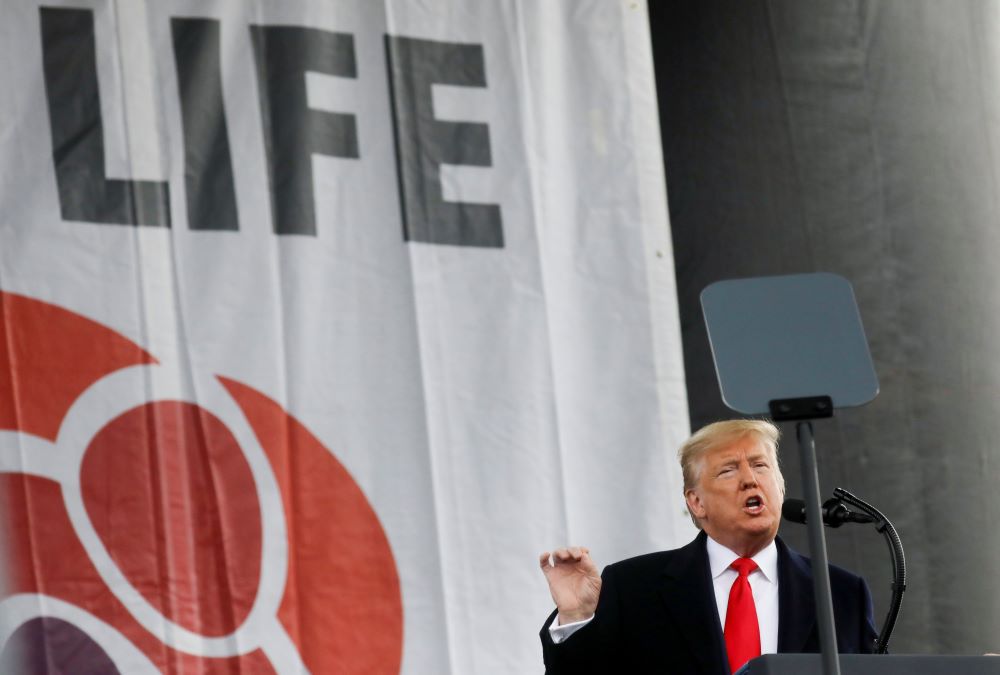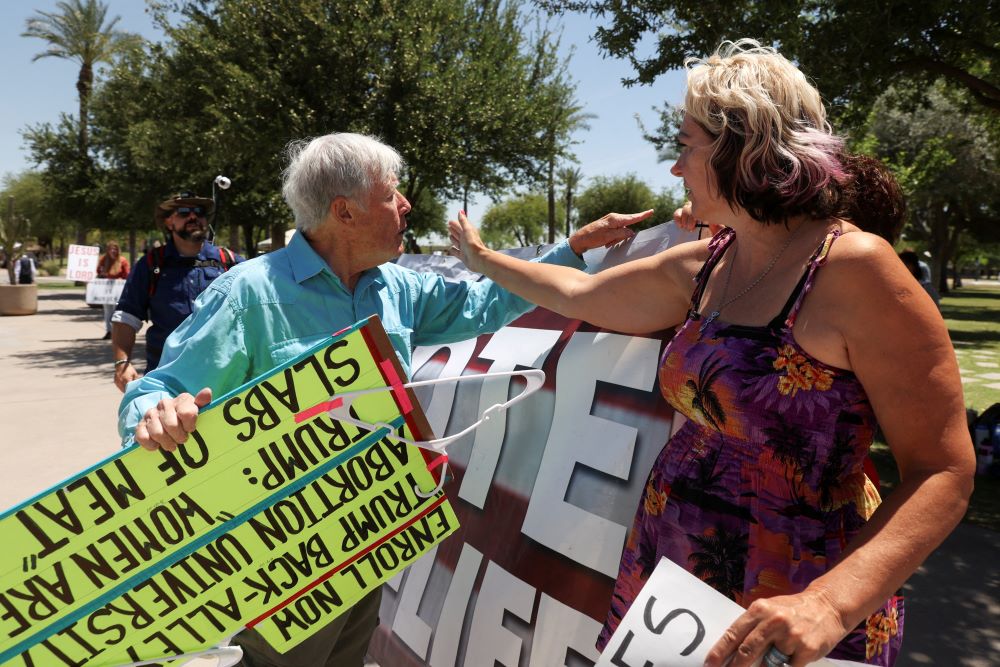
Then-U.S. President Donald Trump addresses thousands of pro-life supporters during the 47th annual March for Life in Washington Jan. 24, 2020. The Republican presidential candidate does not support a nationwide limit on abortion. (OSV News photo/Leah Millis, Reuters)
The Republican National Convention starts today in Milwaukee. For the first time since 1980, and at the insistence of former President Donald Trump, the GOP's platform will not include support for a nationwide limit on abortion.
Party platforms aren't what they once were because political parties aren't what they once were. With the adoption of the McGovern-Fraser commission report in 1971, the process by which presidential candidates are nominated was taken out of the hands of party leaders and placed in the hands of primary voters. In 1976, the U.S. Supreme Court decision in Buckley v. Valeo further weakened the party structure and strengthened the power of independent political action committees and special interest groups.
Conventions became coronations, and the drafting of a party platform often became a means by which the nominee satisfied a special interest group, but the nominee never felt bound by the platform once elected. So platforms morphed from governing manifestos into ways of gauging the influence of particular interest groups within each party. In the case of platform language surrounding the issue of abortion, the changes show the way that issue became dominated by those most highly invested, always with more extreme views and less tolerance for opposing views.
For the foreseeable future, the issue of abortion will vex our politics and it is difficult to see what will change that.
After Roe v. Wade established a constitutional right to abortion in 1973, the language in the two parties' platforms reflected the deep ambivalence many Americans felt about the abortion.
"We fully recognize the religious and ethical nature of the concerns which many Americans have on the subject of abortion," stated the Democratic Party platform of 1976. "We feel, however, that it is undesirable to attempt to amend the U.S. Constitution to overturn the Supreme Court decision in this area." The party was prepared to let Roe stand.
The 1976 Republican Party platform similarly affirmed the attitudes of both its pro-life and pro-choice members. "The question of abortion is one of the most difficult and controversial of our time. It is undoubtedly a moral and personal issue but it also involves complex questions relating to medical science and criminal justice," the platform stated. "There are those in our Party who favor complete support for the Supreme Court decision which permits abortion on demand. There are others who share sincere convictions that the Supreme Court's decision must be changed by a constitutional amendment prohibiting all abortions. Others have yet to take a position, or they have assumed a stance somewhere in between polar positions."
But the GOP went in the opposite direction of the Democrats on the subject of overturning Roe: "The Republican Party favors a continuance of the public dialogue on abortion and supports the efforts of those who seek enactment of a constitutional amendment to restore protection of the right to life for unborn children."
In 1980, when Ronald Reagan became the nominee, the GOP platform became more explicitly pro-life as Reagan's team came to recognize the importance of evangelical voters to their electoral prospects. "While we recognize differing views on this question among Americans in general—and in our own Party—we affirm our support of a constitutional amendment to restore protection of the right to life for unborn children," it said. "We also support the Congressional efforts to restrict the use of taxpayers' dollars for abortion."
The 1992 Democratic Party platform went further on the issue of abortion than ever before. "Democrats stand behind the right of every woman to choose, consistent with Roe v. Wade, regardless of ability to pay, and support a national law to protect that right," the document stated. More important than the platform language was the decision to bar Pennsylvania Gov. Robert Casey, the most prominent pro-life Democrat in the country, from speaking at the national convention.

An abortion opponent and a supporter of legal abortion argue outside the Arizona State Capitol in Phoenix as the state Senate votes to repeal its near total ban on abortion May 1. For the first time since 1980, the GOP's platform will not include support for a nationwide limit on abortion. (OSV News/Reuters/Liliana Salgado)
By 2008, the section of the Democratic platform dealing with abortion was labeled "choice" and its tone was even more aggressive: "The Democratic Party strongly and unequivocally supports Roe v. Wade and a woman's right to choose a safe and legal abortion, regardless of ability to pay, and we oppose any and all efforts to weaken or undermine that right." Sen. Robert Casey Jr., who was less comprehensively pro-life than his father but was still considered a champion of the cause in the party, was given a speaking slot at the national convention.
In 2016, the Republican convention nominated Donald Trump as the party's presidential candidate and the language on abortion remained firm. "The Constitution's guarantee that no one can 'be deprived of life, liberty or property' deliberately echoes the Declaration of Independence's proclamation that 'all' are 'endowed by their Creator' with the inalienable right to life," the text affirmed. "Accordingly, we assert the sanctity of human life and affirm that the unborn child has a fundamental right to life which cannot be infringed. We support a human life amendment to the Constitution and legislation to make clear that the Fourteenth Amendment's protections apply to children before birth."
That was then. In the post-Dobbs era, when referendums even in red states show popular opposition to overly restrictive abortion laws, the political landscape has changed and Trump has decided to drastically change the GOP's platform language about abortion. "We believe that the 14th Amendment to the Constitution of the United States guarantees that no person can be denied Life or Liberty without Due Process, and that the States are, therefore, free to pass Laws protecting those Rights," the platform says. "After 51 years, because of us, that power has been given to the States and to a vote of the People." There is no commitment to a national ban at any stage. The issue is left to the states.
Advertisement
Pro-life advocates have spoken about their distress at the change. Former vice president Mike Pence said the changed language is "a profound disappointment to the millions of pro-life Republicans that have always looked to the Republican Party to stand for life." Marjorie Dannenfelser, president of the Susan B. Anthony List, pointed out the internal contradiction in the new platform language. "It is important that the GOP reaffirmed its commitment to protect unborn life today through the 14th Amendment. Under this amendment, it is Congress that enacts and enforces its provisions," she said.
No one should expect the pro-life movement to abandon the GOP. Dannenfelser made clear that she believes the "mission of the pro-life movement, for the next six months, must be to defeat the Biden-Harris extreme abortion agenda."
The problem with the pro-life strategy of focusing on overturning Roe was always this: Unless you convince the American people, flipping the court was only going to empower pro-choice groups. Both sides are now so dug in, blue states are adopting extreme pro-choice positions that refuse to recognize any moral claims the unborn child's life can and should make on our legal system. Pro-life groups have hitched their wagon to the most amoral person to even serve as president. For the foreseeable future, the issue of abortion will vex our politics and it is difficult to see what will change that.








